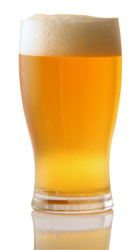Between wet or dry, I do not think it would make much difference. Rice hulls absorb wort. Wort contains sugar. Sugars that are in you rice hulls is less sugar in your brew kettle. Less sugar in your brew kettle equals lower efficiency.How much lower efficiency? Depends on how much rice hulls you put in.I mentioned it as warning that rice hulls affect your beer and you might want to consider that affect. Trying to help put the whole thing together and point out some of the variables.zymotHmmm.. Anyone else with input or experience with rice hulls cutting into eff. if put in dry?I brewed a 45% wheat beer a couple of weeks ago, and used rice hulls (1/2 a lb for a 13 or 14 lb grain bill).My eff. is usually in the mid-60's. However, this batch was at 56%. Would those rice hulls change the eff. that much?

Using Rice Hulls
#21

Posted 13 May 2009 - 07:17 AM
#22

Posted 13 May 2009 - 08:40 AM
#23
 *_Guest_hophead_*
*_Guest_hophead_*
Posted 13 May 2009 - 10:50 AM

#24

Posted 13 May 2009 - 10:57 AM
Dude, please tell me that you have created a beer and have incorporated the goat theme into it... I can see a "Raging Goat IPA" or an "Old Black Goat Stout" or some crazy ass shit like that.
#25
 *_Guest_hophead_*
*_Guest_hophead_*
Posted 13 May 2009 - 11:06 AM
No but you gave me a great idea....goats are a laugh a minute.Dude, please tell me that you have created a beer and have incorporated the goat theme into it... I can see a "Raging Goat IPA" or an "Old Black Goat Stout" or some crazy ass shit like that.
#26

Posted 13 May 2009 - 11:33 AM
Laughing Goat Lager?No but you gave me a great idea....goats are a laugh a minute.
#28

Posted 13 May 2009 - 01:15 PM
#29

Posted 13 May 2009 - 02:16 PM
It seemed to be split on the "soaking" which I assumed would cover this issue.I cant believe we are two pages in and nobody has mentioned rinsing them. This solves the absorption problems and gets all of the dirty nastiness off of them.
#30

Posted 14 May 2009 - 06:04 AM
I've never had a problem with dirty nastiness on my rice hulls.Perchance are you getting used rice hulls from hophead?... and gets all of the dirty nastiness off of them.
#31

Posted 14 May 2009 - 09:37 AM
#32

Posted 14 May 2009 - 10:14 AM
#33

Posted 14 May 2009 - 05:02 PM
Zymot mentioned it earlierI cant believe we are two pages in and nobody has mentioned rinsing them. This solves the absorption problems and gets all of the dirty nastiness off of them.
#34

Posted 17 May 2009 - 06:02 PM
This would be interesting. I dont have any on hand otherwise I would try it.I also wondered, since grain is pretty dusty, if the "nastiness" from the rice hulls is analogous to just the normal grain dist that is filtered out (or maybe not) in laudering.OK: Experiment--1. Into a container measure 1 cup of 150 °F water.2. Add to this container a measured 1/8 cup of rice hulls.3. Mix to hydrate rice hulls.4. Obtain a second container, preferably clear.5. Place a fine mesh strainer on top of the second container6. After a 5 minute standing period, or time of your choice transfer to the second container.7. Let drain for 5 minutes.8. Describe color of liquid.9. Measure volume in second container.10. Taste liquid in second container for off or induced flavors.I'm busy tonight, and the following several..Who volunteers to do this for the sake of knowledge and world wide (web) fame?
#35

Posted 17 May 2009 - 06:25 PM
Setting aside the "nastiness" of the rice hulls... if I hydrate them, then I don't have to account for any water absorption. Although I keep more sparge water on hand than I actually need, so it's no "really" a problem.This would be interesting. I dont have any on hand otherwise I would try it.I also wondered, since grain is pretty dusty, if the "nastiness" from the rice hulls is analogous to just the normal grain dist that is filtered out (or maybe not) in laudering.
#36

Posted 17 May 2009 - 07:46 PM
#37

Posted 17 May 2009 - 07:57 PM
That's been how I've handled it. Maybe a little extra water for the initial infusion and that's it. I don't see why they would be any dirtier than whole malted barley.I never wash them. I put them in my pot as I start to heat up the water and they absorb what little water they are going to. Then I add my grains when I reach my desired temp. Never had any efficiency problems. I also agree with above that rinsing them would be like rinsing grain before you milled it.
#38

Posted 18 May 2009 - 02:42 AM
1 user(s) are reading this topic
0 members, 1 guests, 0 anonymous users















